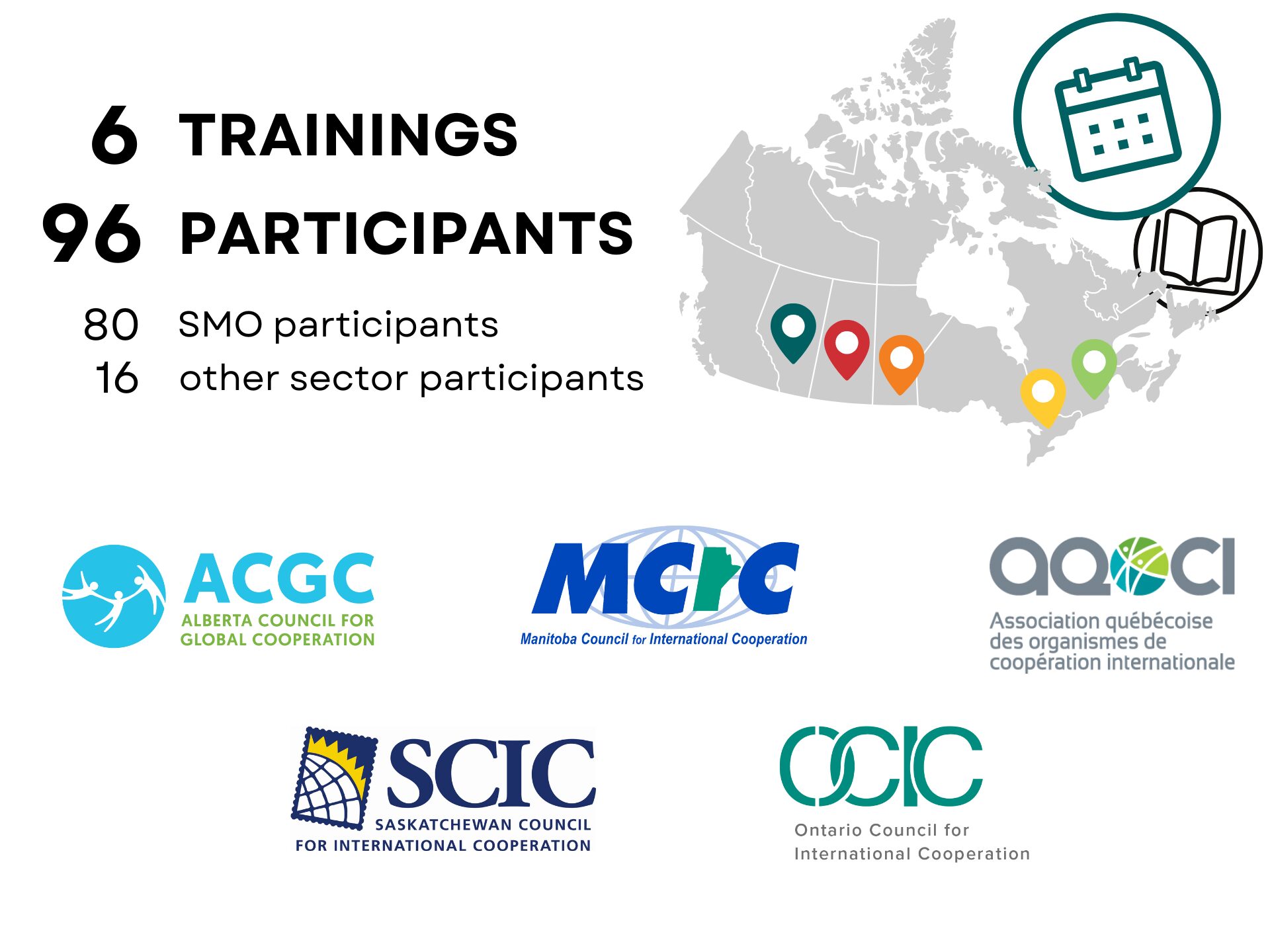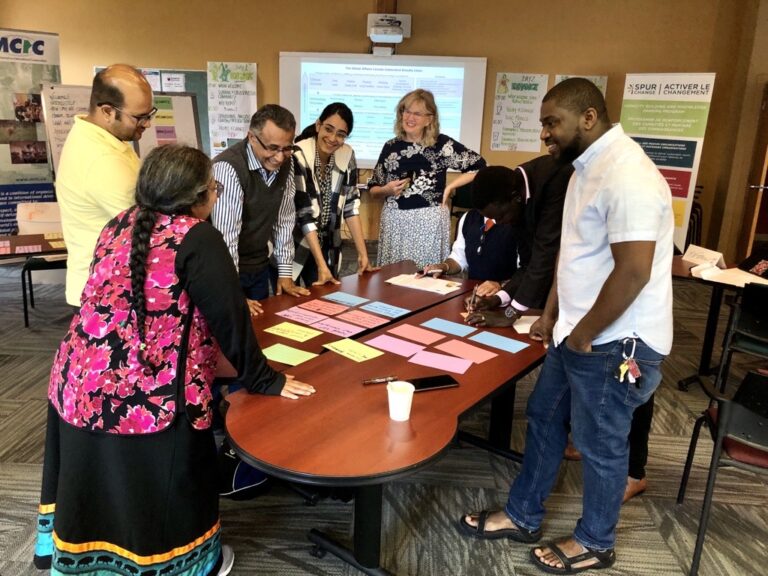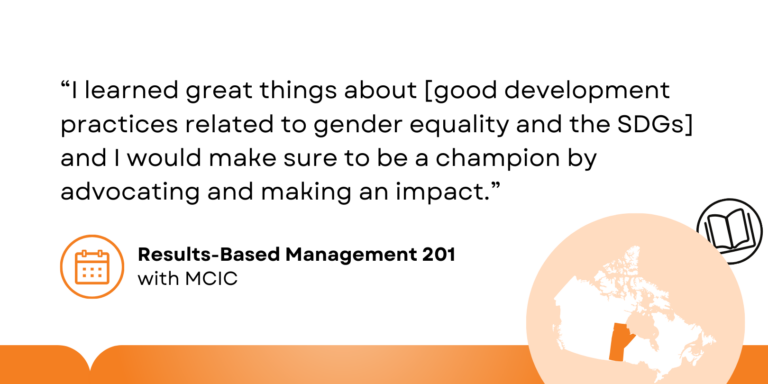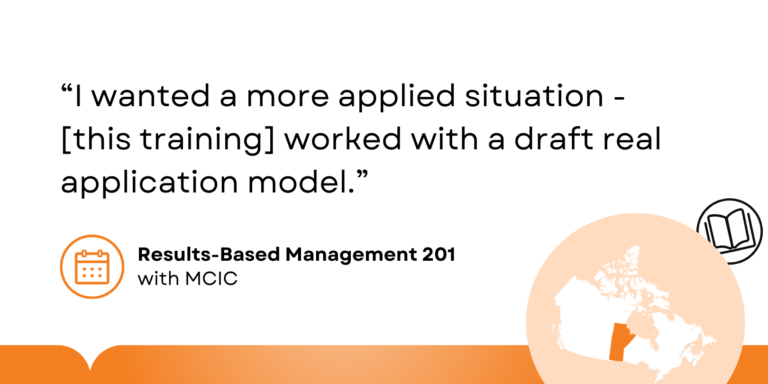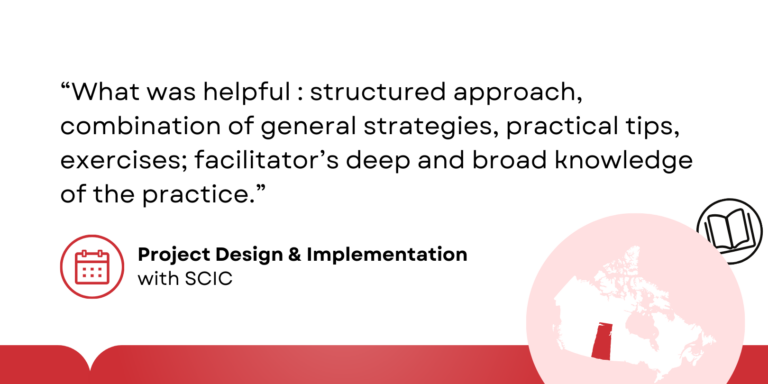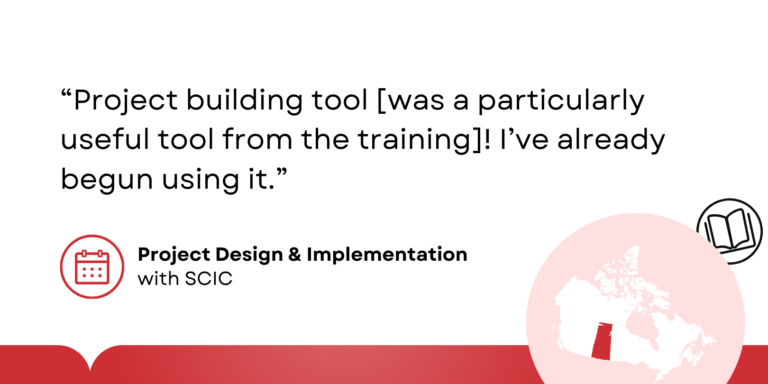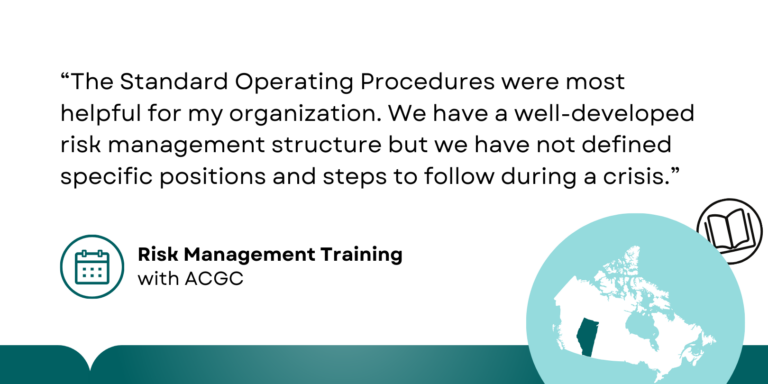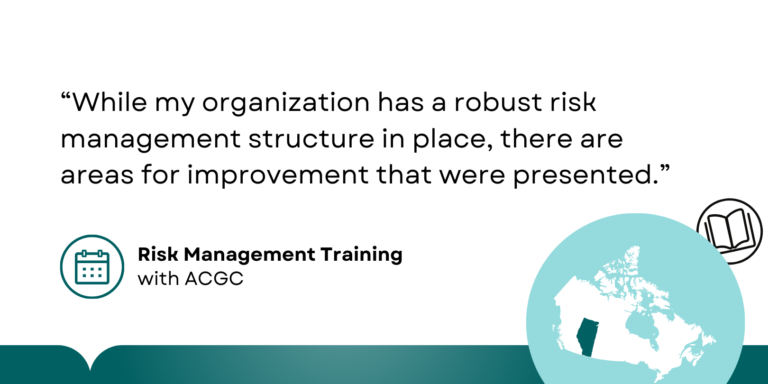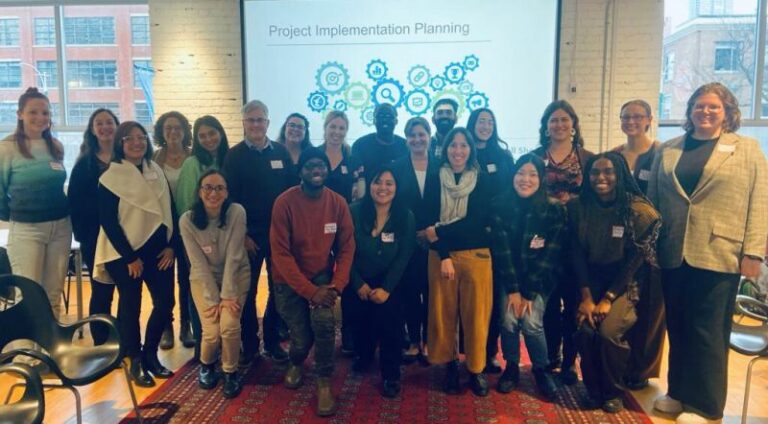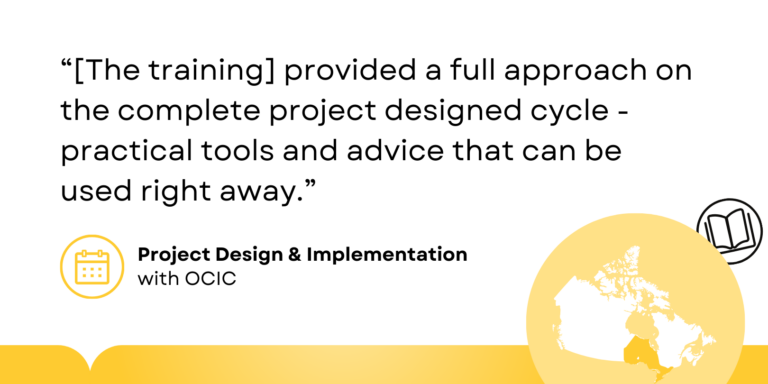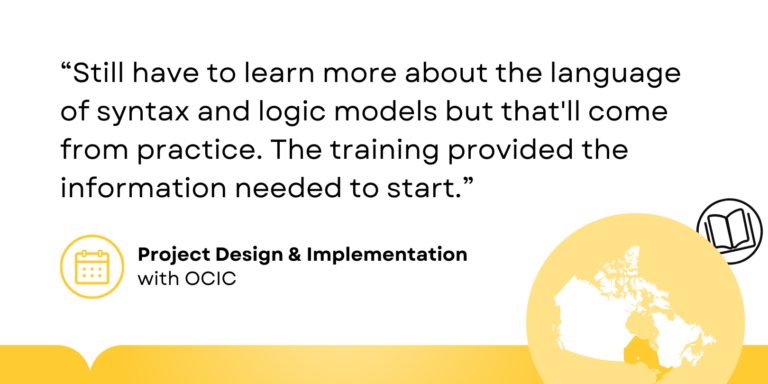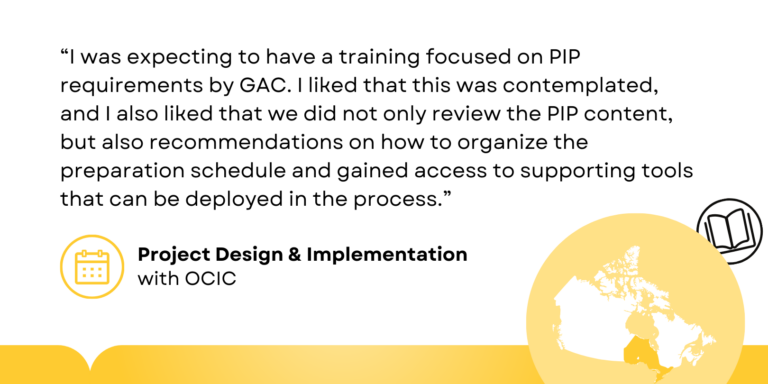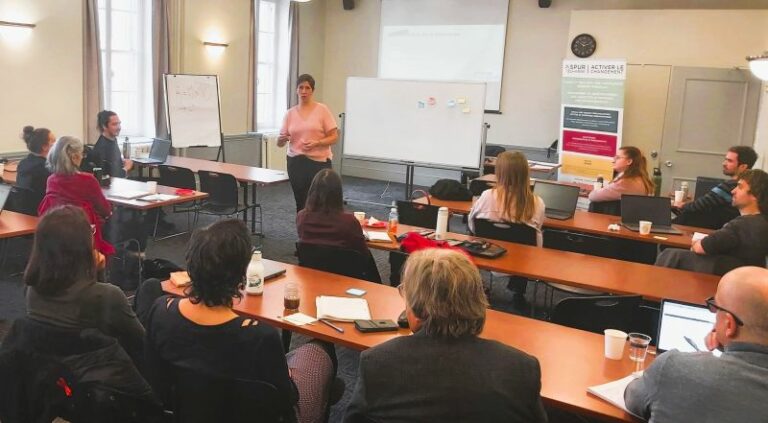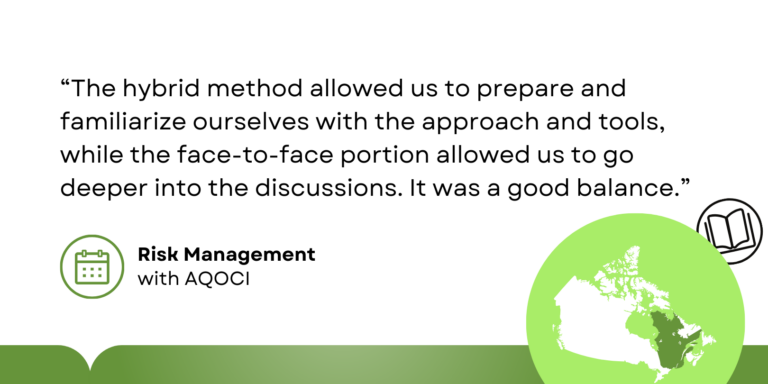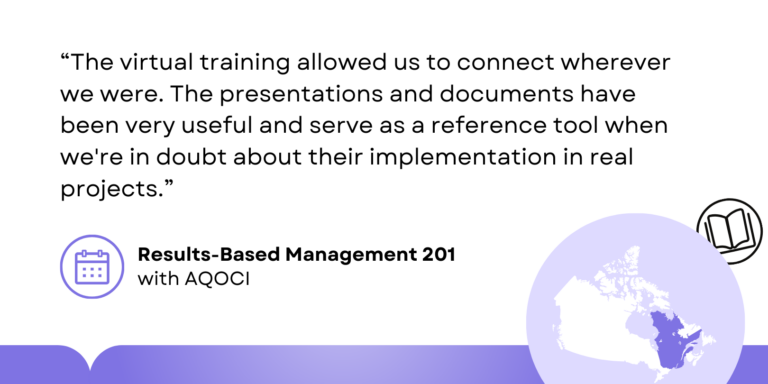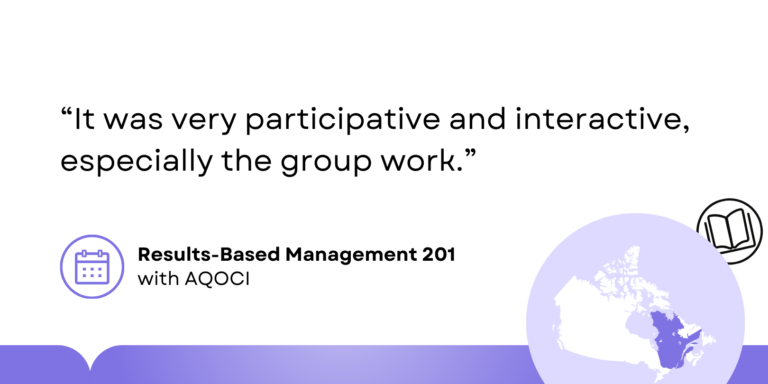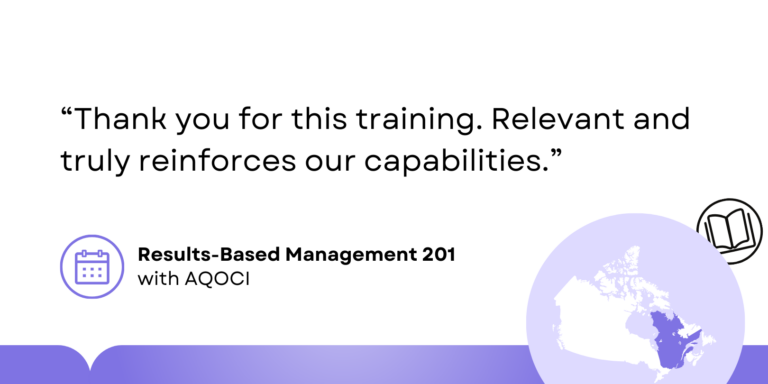
Since 2019, Spur Change has designed and held a wide range of training and learning opportunities tailored for Canadian small and medium size organizations (SMOs) working in international cooperation.
In the fall of 2023, we made use of our collected training roster and resource materials to create a Menu Approach - a collection of past Spur Change Training opportunities presented to the provincial and regional councils across the country for them to offer to their own members. Through consultation with councils, Spur provided each with an option of 6 different trainings (view the list of trainings at the bottom of the page). Based on the needs of the SMOs in the region, each council selected one that was most relevant to their SMO audience. Each training was then coordinated with previous consultants and facilitators with which Spur Change has developed a strong relationship with over the years and who were available to provide their knowledge and resources–revamping the learning materials where necessary to meet the needs of the region.
Under this approach, Spur Change implemented 6 trainings from coast to coast to coast. Learn more about each of the trainings below.
Results-Based Management 201
Date: September 19-21, 2023
Location: Winnipeg, MB
In September, along with the Manitoba Council for International Cooperation (MCIC) and RBM facilitator Darren Brown, we hosted a 2 day in-person, intermediate, training on Results-Based Management (RBM). Designed as a follow-up to our online, self-paced RBM 101 course, RBM 201 focused on learning by applying the fundamentals of RBM through a case-study. By using an intersectional approach, taking into consideration gender equality and SDGs, the training provided organizations a co-creative space for participants to deepen their skills and ask questions while developing sample theories of change, logic models, performance-measurement frameworks and more. Participants came with a wide range of learning expectations from meeting reporting needs to donors and writing better grant applications with clear benchmarks to gaining a practical understanding of programming frameworks using RBM tools.
Project Design and Implementation Training
Date: September 26, 2023
Location: Saskatoon, SK
The following training in the Menu Approach was held with The Saskatchewan Council for International Cooperation (SCIC), in partnership with Claire Holloway from Small Shop Big Impact. Together, we hosted a 2 day in-person training on Project Design and Implementation planning. The training focused primarily on the implementation process of undertaking a project, validating data and building consensus across partners. This is a pivotal process required for projects funded through Global Affairs Canada (GAC) or otherwise, including an understanding of theory of change & logic model, integrating gender equality or project governance. Participants based in Saskatchewan came with a wide range of learning expectations such as hoping to gain more knowledge and practical tips in developing strong PIPs to verifying internal organizational structures so that it meets GAC standards.
Find the slides from the workshop on the Spur Change resource library.
Find the project builder tool for free download on Small Shop Big Impact’s website.
Risk Management Training Series
Date: November 1-15, 2023
Location: Online
For our third training of the series and in partnership with the Alberta Council for Global Cooperation (ACGC) and Marie-Claude du Cap from Aléas, we hosted a 3 day online training series on Risk Management. The main premise of the training was to better equip SMOs with the means and procedures to anticipate, identify, and mitigate risks, be it a travel-related risk or otherwise. Through a combination of online self-learning modules and live zoom sessions, SMOs were able to identify key priorities when managing crises effectively and generally improve risk management practices keeping personnel and their public safe, secure, and healthy. Participants came with a wide range of learning expectations such as helping teams improve performance when traveling abroad and identifying threats of climate change or organizational risks to ensure an appropriate system in place to mitigate and manage risk more effectively.
Project Design & Implementation Training
Date: December 6-7, 2023
Location: Toronto, ON
In December with the Ontario Council for International Cooperation (OCIC) and once again with Claire Holloway from Small Shop Big Impact, we hosted a 2 day in-person training on Project Design and Implementation planning. The training focused primarily on the implementation process of undertaking a project, validating data and building consensus across partners. This is a pivotal process required for projects funded through Global Affairs Canada including an understanding of theory of change & logic model, integrating gender equality or project governance. Participants based in Ontario came with a wide range of learning expectations such as hoping to strengthen their skills in creating a PIP and post award work specific to Global Affairs to gaining more confidence in writing grant applications for solicited proposals in Canada.
Find the slides from the workshop on the Spur Change resource library.
Find the project builder tool for free download on Small Shop Big Impact's website.
Risk Management Training
Date: January 17, 2024
Location: Montreal, QC
In January along with the Association québécoise des organismes de coopération internationale (AQOCI) and Marie-Claude du Cap from Aléas, we hosted a 1 day in-person training on organizational Risk Management. The main objective of the training was to better equip SMOs with the means and procedures to anticipate, identify, and mitigate risks, be they travel-related or otherwise. Participants had a combination of self-learning materials prior to the in-person workshop which mainly focused on assessing the organization’s risk taxonomy. Through in depth assignments and discussions, participants addressed how to identify and analyze risks to implement appropriate mitigation measures; develop diligent partnerships; make decisions that respect the organization's tolerance threshold and understand scenario-based planning to develop contingency plans. Prior to the training, participants came with a wide range of learning expectations from improving safety practices; being better equipped for crisis management that concerns local employees or creating contingency plans for better organizational structures.
Results-Based Management 201
Date: February 20-29, 2024
Location: Online
Lastly, in February, along with the Association québécoise des organismes de coopération internationale (AQOCI) and facilitated by Baastel, we hosted a 3 day online, intermediate, training on Results-Based Management (RBM) in French. Designed as a follow-up to our online, self-paced RBM 101 course, RBM 201 focused on learning by applying the fundamentals of RBM through a case-study. By using an intersectional approach, taking into consideration gender equality and SDGs, the training provided organizations a co-creative space for participants to deepen their skills and ask questions while developing sample theories of change, logic models, performance-measurement frameworks and more. Some participants in this training were completely new to RBM, with RBM 101 being their first experience, and were looking to strengthen their understanding of the fundamentals further. At the same time, others were looking to better understand the RBM framework used at their organization and on their current projects.
Lessons Learned
This year's menu approach couldn’t have been possible without the collaboration of the councils across Canada and consultants who have provided their knowledge and contribution to the learning materials. To conclude this year’s episode of our menu approach, here are some of our best practices that came out of the planning and coordination process:
- Meeting the current needs and realities of councils: Throughout the consultation process, it was imperative to meet the needs of councils and their membership. This tailored approach aligns with Spur Change’s goals of supporting the councils engaging SMOs and ensuring the councils build the working relationship with their regional audience.
- Fostering a collaborative and engaging learning environment : Our training survey results show that participants prefer to have room for collaboration, engage in conversations, and reflect on their experience with other organizations. A great focus was given on having mixed adult education methods such as group activities, reflection spaces and peer-to-peer learning formats.
- In-person vs virtual settings: While most of the training activities held by Spur Change over the years have happened online (due to shifting our implementation strategy with the COVID-19 pandemic), this year we had 4 out of 6 training in-person. This not only created an increased satisfaction towards a safe learning environment but more importantly connected like-minded organizations in each province. Participant feedback overwhelmingly links the networking and peer-sharing strengths to the in-person workshop format.
Table of Spur Change trainings presented to councils of the ICN as part of the Menu Approach strategy
Results-Based Management (RBM) 201 is an intermediate course focused on learning through application. Building off RBM 101, this course provides participants a case study to build a sample RBM framework with facilitator support.
Making Data Collection Meaningful
This course dives into planning for data collection, gender-sensitive, feminist and community-led approaches to data collection, and technology for data collection.
These micro-learning sessions provide the necessary starting points of a project development process in order to collect information on the status of a subject before any type of intervention can affect it.
The Risk Management Training focuses on scenario-based planning to better prepare organizations for the unknown. Be it travel-risks or otherwise, the training goes over tools to anticipate, mitigate, and respond to risks for staff, volunteers, and more.
Project Implementation Plan (PIP) (also known as Project Design & Implementation Training)
The Project Implementation Plan (PIP) training goes over the fundamentals of a PIP in accordance with Global Affairs Canada. The course material can be adapted to any project management cycle, not only GAC-funded projects.
Building Equity: Resource Mobilization for Impact
This training program aims to build capacity and confidence to develop a diversified, ethical, and equity-centered fundraising and resource mobilization strategy.

